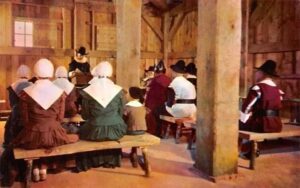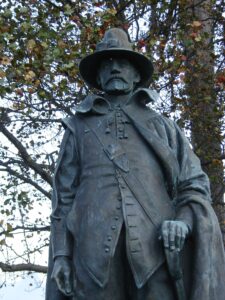 To set the context for this story, we need to rehearse the theology of the Pilgrim Church in relation to its minister. Pastor John Robinson had taught them in Leiden that “a company of faithful people thus covenanting together are a church, though they be without any officers among them.” Robinson had taught that “if the New Testament speak of ordaining elders in the church, then doth it necessarily conclude, yea expressly affirm, that there were churches before elders were ordained in them.” Several churches in the book of Acts functioned for years without leaders being ordained. Robinson taught that an officer takes a step down to serve and is not to be viewed as more important than other members.
To set the context for this story, we need to rehearse the theology of the Pilgrim Church in relation to its minister. Pastor John Robinson had taught them in Leiden that “a company of faithful people thus covenanting together are a church, though they be without any officers among them.” Robinson had taught that “if the New Testament speak of ordaining elders in the church, then doth it necessarily conclude, yea expressly affirm, that there were churches before elders were ordained in them.” Several churches in the book of Acts functioned for years without leaders being ordained. Robinson taught that an officer takes a step down to serve and is not to be viewed as more important than other members.
William Morrell was the first minister to arrive in 1623, and though he stayed a year, he kept to himself and wrote Latin poetry, never functioning as a leader. The second was John Lyford, and as you will see, he was exposed as a disaster. The third was Mr. Rogers about three years later. However, the congregation “perceived upon some trial that he was crazed in the brain” and thus sent him back. Finally, Ralph Smith became the fourth and ministered from 1629 to 1636. Though staying for seven years, the Plymouth Church records indicate “he proved but a poor help to them.” Ralph Smith’s associate for three years, beginning in 1631, was Roger Williams, who would become more famous than all of them. Though the Plymouth Church recognized that he was “a man godly and zealous, having many precious parts,” they also saw that he was “unsettled in judgment.” Historian Richard Maxwell wrote that the church determined “it had pleased God to put a windmill in his head!”
 Bradford often summarized the views of the congregation, not just his own. So why would a congregation appear to be so difficult to lead? Pastor Robinson had been such a good teacher that the common members were quite literate in the Scriptures. They also practiced self-government, and “examined” ministers to see if they could take them deeper. One might say, John Robinson left big shoes to fill, and that would be right, but probably more accurately, it is hard to minister to a congregation whose character and knowledge exceeds the one who has come to lead them. Thus, when John Lyford arrived, sent “at the Merchant’s charge… to be their Pastor,” his character was quickly exposed. As we summarize his story, let us remember why it is imperative for leaders to be a good example. (See 1 Tmothy 4:12.)
Bradford often summarized the views of the congregation, not just his own. So why would a congregation appear to be so difficult to lead? Pastor Robinson had been such a good teacher that the common members were quite literate in the Scriptures. They also practiced self-government, and “examined” ministers to see if they could take them deeper. One might say, John Robinson left big shoes to fill, and that would be right, but probably more accurately, it is hard to minister to a congregation whose character and knowledge exceeds the one who has come to lead them. Thus, when John Lyford arrived, sent “at the Merchant’s charge… to be their Pastor,” his character was quickly exposed. As we summarize his story, let us remember why it is imperative for leaders to be a good example. (See 1 Tmothy 4:12.)
Lyford arrived on the ship Charity in 1624 with the others we have mentioned, such as the shipmaster, salter, and shipbuilder. Bradford relates: “The third eminent person (which the letters before mention) was the minister which they sent over, by name Mr. John Lyford…. When this man first came ashore, he saluted them with that reverence and humility as is seldom to be seen, and indeed made them ashamed, he so bowed and cringed unto them, and would have kissed their hands if they would have suffered him; yea, he wept and shed many tears, blessing God that had brought him to see their faces, and admiring things they had done in their wants, etc., as if he had been made all of love and the humblest person in the world.”
Whenever an individual goes to the extreme of flattering others or abasement of themselves, there is usually something of their character that is being concealed. Bradford and Brewster received him “and gave him the best entertainment they could, in all simplicity.” They even took him in as a counselor in leadership and, after his “large confession,” membership in the church. He acknowledged “his former disorderly walking and his being entangled with many corruptions, which had been a burthen to his conscience, and blessed God for this opportunity of freedom and liberty to enjoy the ordinances of God in purity among His People.”
John Oldham (29), an individual 15 years younger than Lyford, who “had been a chief stickler in the former faction among the Particulars… since the coming of this ship… took occasion to open his mind to some of the chief amongst them here, and confessed he had done them wrong both by word and deed, and writing to England.” (Those who came “on their Particular” meant they were not bound to the original financial agreement.) His confession was received at face value, with caution, for a new start.
Though initially taking people’s confession at face value, with grace, we must recognize that in time, no one can hide their true character, for the habits of conduct will reveal themselves sooner or later. Bradford wrote, “Thus all things seemed to go very comfortably and smoothly on amongst them, at which they did much rejoice. But this lasted not long, for both Oldham and he (Lyford) grew very perverse, and showed a spirit of great malignancy, drawing as many into faction as they could.”
 Lyford and Oldham began holding private meetings, as Bradford described: “Whisperings amongst them… which brought others as well as themselves into a fool’s paradise.” When the Charity was ready to return to England, Bradford discovered the letters Lyford was sending to England with lies and accusations. As a wise leader, Bradford wanted to “let things ripen that they might better discover their intents and see who were their adherents.” As is the pattern of discord, soon “without ever speaking one word either to the Governor, Church, or Elder, withdrew themselves and set up a public meeting apart on the Lord’s Day; with sundry such insolent carriages… beginning now to act what privately they had been long plotting.”
Lyford and Oldham began holding private meetings, as Bradford described: “Whisperings amongst them… which brought others as well as themselves into a fool’s paradise.” When the Charity was ready to return to England, Bradford discovered the letters Lyford was sending to England with lies and accusations. As a wise leader, Bradford wanted to “let things ripen that they might better discover their intents and see who were their adherents.” As is the pattern of discord, soon “without ever speaking one word either to the Governor, Church, or Elder, withdrew themselves and set up a public meeting apart on the Lord’s Day; with sundry such insolent carriages… beginning now to act what privately they had been long plotting.”
Though initially denying everything, his letters were read publicly, from the originals, and everything was brought out into the open. His past was fully revealed: fathering two children out of wedlock, raping a girl in his parish in Ireland, being expelled from his parish, continuing to engage in sexual misconduct with housemaids (revealed by his wife, Sarah), and now attempting to turn those in England against the Separatist congregation in Plymouth as well as start another church without open communication declaring his true purpose.
When there was no possibility of denying these facts, he “burst into tears, and confessed he ‘feared he was a reprobate, his sins were so great he doubted God would pardon them’ …he had ‘so wronged them as he could never make them amends.’” All of these were extreme reactions that cloud over the fact that true repentance and remorse were not in his heart.
Human nature is the same anywhere and at any time. Proverbs 6:12-19 outlines the dangerous pattern of sowing discord: perverse tongue; proud, exaggerated emotions (of praise or apology); lying; pointing blame; devising evil privately to destroy harmony; and worst of all, planting seeds of divisiveness. The solution (prescribed in Matthew 18:15-17) is to allow issues to ripen first; then confront privately; next with witnesses bring it into the open; and finally, as Bradford writes, “The court censured them to be expelled from the place.”
Individuals, families, and churches can learn from how the Pilgrims handled similar situations that face us today. As the American culture goes through these same trials nationally, may we have leaders with enough character to help us experience a solution to our divisiveness as a nation!







